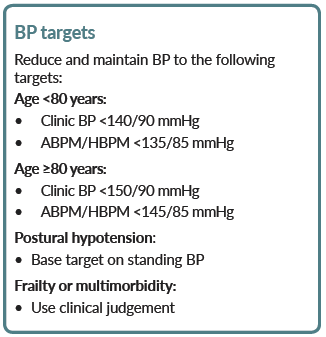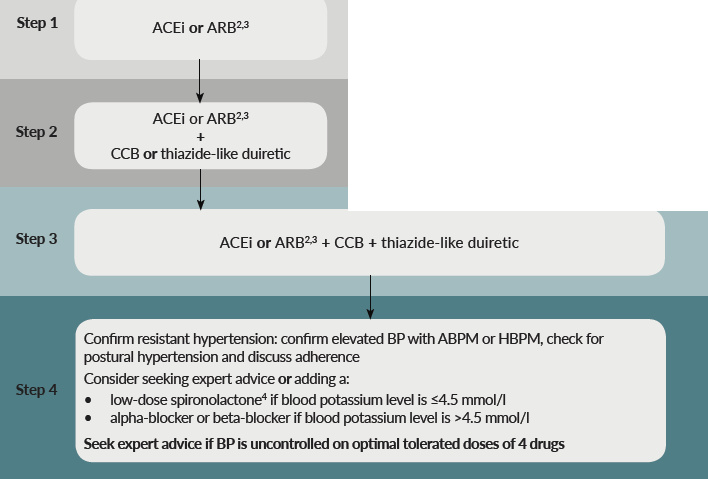ACE inhibitors in type 2 diabetes with hypertension
Last reviewed dd mmm yyyy. Last edited dd mmm yyyy
The role of ACE inhibitors in patients with diabetics has been investigated in the studies such as the:
- HOPE study in diabetics
- the HOPE study (n=9,297, 38% with diabetes) provided evidence that ramipril significantly reduced the risk of MI, stroke or cardiovascular death compared with placebo over five years (14.0% vs. 17.8%; NNT 27) - benefits were especially evident in the subgroup of patients with diabetes
- it has been suggested that these effects of ramipril are beyond those that could be expected from its BP lowering properties - however, this has been disputed by meta-analyses that suggest, for most cardiovascular outcomes, BP lowering effects account for the majority of the benefits seen with different antihypertensives (1)
ACE inhibitors (and ARBs) slow the progression of renal disease in diabetes independent of the effects of blood pressure (2)
The guidance regarding combination treatment of systemic hypertension has been updated (2):
BP targets in adults:

in people with CKD and diabetes, and also in people with an ACR of 70 mg/mmol or more, aim to keep the systolic blood pressure below 130 mmHg (target range 120-129 mmHg) and the diastolic blood pressure below 80 mmHg (2,3)
NICE guidance states (4):
- for children and young people with CKD and diabetes (type 1 or 2), offer an ARB or an ACE inhibitor (titrated to the highest licensed dose that they can tolerate) if ACR is 3 mg/mmol or more
Starting antihypertensive drug treatment
Offer antihypertensive drug treatment in addition to lifestyle advice to adults of any age with persistent stage 2 hypertension. Use clinical judgement for people of any age with frailty or multimorbidity.
Discuss starting antihypertensive drug treatment, in addition to lifestyle advice, with adults aged under 80 with persistent stage 1 hypertension who have 1 or more of the following:
- target organ damage
- established cardiovascular disease
- renal disease
- diabetes
- an estimated 10-year risk of cardiovascular disease of 10% or more
- use clinical judgement for people with frailty or multimorbidity
Consider antihypertensive drug treatment in addition to lifestyle advice for adults aged under 60 with stage 1 hypertension and an estimated 10-year risk below 10%
- note that 10-year cardiovascular risk may underestimate the lifetime probability of developing cardiovascular disease
Consider antihypertensive drug treatment in addition to lifestyle advice for people aged over 80 with a clinic blood pressure of over 150/90 mmHg
- use clinical judgement for people with frailty or multimorbidity
Measure standing as well as seated blood pressure in people with hypertension and:
- with type 2 diabetes or
- with symptoms of postural hypotension or
- aged 80 and over.
- in people with a significant postural drop or symptoms of postural hypotension, treat to a blood pressure target based on standing blood pressure
Offer people with isolated systolic hypertension (systolic blood pressure 160 mmHg or more) the same treatment as people with both raised systolic and diastolic blood pressure
For adults aged under 40 with hypertension, consider seeking specialist evaluation of secondary causes of hypertension and a more detailed assessment of the long-term balance of treatment benefit and risks
Suggested management for patients with type 2 diabetes and hypertension (1):

1 For women considering pregnancy or who are pregnant or breastfeeding, see NICE's guideline on hypertension in pregnancy. For people with chronic kidney disease, see NICE's guideline on chronic kidney disease. For people with heart failure, see NICE's guideline on chronic heart failure
2See MHRA drug safety updates on ACE inhibitors and angiotensin-II receptor antagonists: not for use in pregnancy, which states 'Use in women who are planning pregnancy should be avoided unless absolutely necessary, in which case the potential risks and benefits should be discussed', ACE inhibitors and angiotensin II receptor antagonists: use during breastfeeding and clarification: ACE inhibitors and angiotensin II receptor antagonists. See also NICE's guideline on hypertension in pregnancy.
3Consider an ARB, in preference to an ACE inhibitor in adults of African and Caribbean family origin.
4 At the time of publication (August 2019), not all preparations of spironolactone have a UK marketing authorisation for this indication.
Abbreviations: ABPM, ambulatory blood pressure monitoring; ACEi, ACE inhibitor; ARB, angiotensin-II receptor blocker; BP, blood pressure; CCB, calcium-channel blocker; HBPM, home blood pressure monitoring.
NICE guidance states with respect to type 1 diabetes (2):
Blood pressure management
- intervention levels for recommending blood pressure management should be 135/85 mmHg unless the adult with type 1 diabetes has albuminuria or 2 or more features of metabolic syndrome, in which case it should be 130/80 mmHg
- start a trial of a renin-angiotensin system blocking drug as first-line therapy for hypertension in adults with type 1 diabetes
Do not allow concerns over potential side effects to inhibit advising and offering the necessary use of any class of drugs, unless the side effects become symptomatic or otherwise clinically significant. In particular:
- do not avoid selective beta-adrenergic blockers where indicated in adults on insulin
- low-dose thiazides may be combined with beta-blockers
- when calcium channel antagonists are prescribed, use only long-acting preparations
- use direct questioning to detect the potential side effects of erectile dysfunction, lethargy and orthostatic hypotension with different drug classes
Reference:
- Staessen JA, Wang J-G, Thijs L. Cardiovascular protection and blood pressure reduction: a meta-analysis. Lancet 2001;358:1305–15.
- NICE (March 2022). Clinical management of primary hypertension in adults
- NICE (August 2015). Type 1 diabetes in adults: diagnosis and management
- NICE (November 2021). Chronic kidney disease: assessment and management
Related pages
Create an account to add page annotations
Add information to this page that would be handy to have on hand during a consultation, such as a web address or phone number. This information will always be displayed when you visit this page